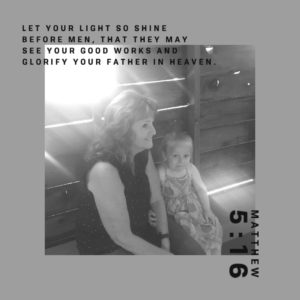Psalm 37:7 “Be still before the Lord and wait patiently for him; fret not yourself over the one who prospers in his way, over the man who carries out evil devices.”
 We have all heard the saying, “Give me patience, Lord, and please hurry.” Waiting without worrying is a difficult task for most of us. We tap our feet waiting for God to work and though we ask that His will be done, we also would like His will to be in our time frame. But God has surrounded us with a world that can’t be rushed, as an example of how we should live. Trees grow at their pace, the tides are predictable almost to the minute, the sun rises with the accuracy of a timepiece, and nothing we can do will radically change the processes of nature. God seems to be the great scheduler and the world around us is a constant reminder of that.
We have all heard the saying, “Give me patience, Lord, and please hurry.” Waiting without worrying is a difficult task for most of us. We tap our feet waiting for God to work and though we ask that His will be done, we also would like His will to be in our time frame. But God has surrounded us with a world that can’t be rushed, as an example of how we should live. Trees grow at their pace, the tides are predictable almost to the minute, the sun rises with the accuracy of a timepiece, and nothing we can do will radically change the processes of nature. God seems to be the great scheduler and the world around us is a constant reminder of that.
In Ecclesiastes 3 we read that “For everything there is an appointed time, and an appropriate time for every activity on earth: A time to be born, and a time to die; a time to plant, and a time to uproot what was planted; A time to kill, and a time to heal; a time to break down, and a time to build up; A time to weep, and a time to laugh; a time to mourn, and a time to dance. A time to throw away stones, and a time to gather stones; a time to embrace, and a time to refrain from embracing; A time to search, and a time to give something up as lost; a time to keep, and a time to throw away; A time to rip, and a time to sew; a time to keep silent, and a time to speak. A time to love, and a time to hate; a time for war, and a time for peace. (Ecclesiastes 3:1-8) God is the great timekeeper. He knows the best times. He has built a world that demands our patience. The farmer should not force the fields, anymore than we should force God to work in our lives before the time is right.
before the time is right.
There was once a little girl who tried to help a butterfly out by opening up its cocoon. When the butterfly died, the girl’s father explained that the butterfly actually needed the struggle of leaving the cocoon to prepare it for its life journey ahead. The butterfly died because of the girl’s good intentions. It was not yet strong enough to leave its “womb,” and had been forced into the world too soon. We sometimes wish that God would jump in and give us what we want as soon as we want it. Sadly, that would often leave us unprepared to take on what lies ahead.
 I sometimes have students who don’t want to wait long enough to put a second coat of varnish on their projects. They will put the second coat on before the first coat has completely dried. It causes all kinds of problems. Their impatience leads to long sanding sessions and two or three extra coats of varnish. In an attempt to finish things quickly, they actually add two or more days to the project. Of course, they usually only do that once!
I sometimes have students who don’t want to wait long enough to put a second coat of varnish on their projects. They will put the second coat on before the first coat has completely dried. It causes all kinds of problems. Their impatience leads to long sanding sessions and two or three extra coats of varnish. In an attempt to finish things quickly, they actually add two or more days to the project. Of course, they usually only do that once!
We often do the same thing with our lives. We desire the end product before it is ready. My mom used to keep a toothpick with her when she baked. She would open up the stove and stick that toothpick in to check the progress of the cake. She understood the need to wait. If it would have been me, I probably would have been pulling the cake out when it could still be poured! I wanted that cake sooner than it was ready. God keeps a toothpick handy and we don’t. He waits until things are ready, but we won’t.
An old friend of ours, Mildred Bilderback, had a cute saying that she pulled out once in awhile when someone showed impatience. “If we try to fix a fix that God has fixed to fix us, He will have to fix another fix to fix us.” This little tongue-twister has a good message. God knows what lies ahead and wants us to be prepared for it. If we try to shortcut around His path, we will eventually have to get back on His path again and all we will have done is taken the long way around.
Lack of patience can keep us from doing God’s work. Some of the greatest missionaries of history devotedly spread the seed of God’s Word and yet had to wait long periods before seeing the fruit of their efforts. William Carey, for example, labored 7 years before the first Hindu convert was brought to Christ in Burma, and Adoniram Judson toiled 7 years before his faithful preaching was rewarded. In western Africa, it was 14 years before one convert was received into the Christian church. In New Zealand, it took 9 years; and in Tahiti, it was 16 years before the first harvest of souls began. Had these missionaries given up because of impatience, the thousands who eventually came to know Jesus through their ministries may have never become a part of the Body of Christ.
and yet had to wait long periods before seeing the fruit of their efforts. William Carey, for example, labored 7 years before the first Hindu convert was brought to Christ in Burma, and Adoniram Judson toiled 7 years before his faithful preaching was rewarded. In western Africa, it was 14 years before one convert was received into the Christian church. In New Zealand, it took 9 years; and in Tahiti, it was 16 years before the first harvest of souls began. Had these missionaries given up because of impatience, the thousands who eventually came to know Jesus through their ministries may have never become a part of the Body of Christ.
I once heard a story of a mother who was shopping with a crying, demanding three-year-old in the cart. The mother would say, “There are only three more rows, Ellen, and we will be leaving.” The child would demand something else in a loud voice and the mother would softly say, “Only a few more things, Ellen, and we will be checking out.” The girl continued her crying in the checkout line, and the mother said quietly, “We will be in the parking lot in just a minute, Ellen.”
 A man happened to hear the whole thing and saw the mother in the parking lot while he was leaving. “I couldn’t help noticing how patient you were with little Ellen in the store,” he said, smiling at the mother.
A man happened to hear the whole thing and saw the mother in the parking lot while he was leaving. “I couldn’t help noticing how patient you were with little Ellen in the store,” he said, smiling at the mother.
“Oh, my daughter’s name is Tammy. My name is Ellen.”
Sometimes we need to patiently remind ourselves that the world does not always move at our desired pace. We are told in Thessalonians to “… admonish the idle, encourage the fainthearted, help the weak, be patient with them all.” (1Thessalonians 5:14) God asks us to be patient with people and patient with situations and especially patient with His work in our lives. We can do that if we truly believe that He loves us, He is in control, and He desires the best for us. We live in a world of turmoil around us, it is important that we live lives that have peace within us. We cannot change the world; we can only change ourselves. That power cannot come from us; it can only come from God.
I was sitting at a red light the other day and in front of me was a huge sixteen wheeler and another car. The light turned green, but the truck did not move. The car in front of me started honking (as you know, the only thing faster than the rapture is the honk of the car behind you when the light turns green), and after a few seconds a motorized wheelchair came creeping out from in front of the truck. It was barely moving and apparently did not have time to get across before the light turned. I had to think how foolish the man in front of me felt when the wheelchair finally pulled onto the sidewalk and we started moving. How much are we  like that man, though. God can see something that we can’t see and here we are honking our horns of impatience.
like that man, though. God can see something that we can’t see and here we are honking our horns of impatience.
“For whatever things were written before were written for our learning, that we through the patience and comfort of the Scriptures might have hope. Now may the God of patience and comfort grant you to be like-minded toward one another, according to Christ Jesus.” (Romans 15:4-5) May the comfort of the Word and the presence of God give us patience today. Like my mom used to say, “You need to trust my toothpick more than your eyes.” Remember God is carrying the toothpick and we will surely reap the rewards- in due time.




























